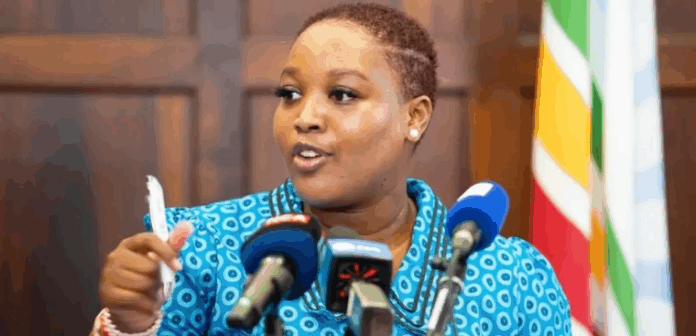The ANC is scrambling for a lifeline from smaller parties in Parliament after the DA once again pulled the rug out from under its coalition partner – this time by torpedoing critical budget votes in Parliament.
With the DA refusing to back key departmental allocations because President Cyril Ramaphosa axed its trade, industry, and competition deputy minister, Andrew Whitfield, the ANC now faces a governance emergency, forced to desperately court smaller parties to salvage the 2025 Appropriation Bill and avert a shutdown of government spending.
Billions of rands in government expenditure are frozen after the National Assembly rejected four departmental budgets, including those for public works and infrastructure, higher education, and human settlements.
The failure, sparked by the DA’s dramatic withdrawal of support, has not only deepened rifts within the government of national unity (GNU) but left the ANC scrambling for the numbers to keep the state functioning.
The parliamentary impasse is immediate and severe: All 42 departmental allocations listed in Schedule 1 of the Appropriation Bill must be passed individually by a majority of MPs. A legal opinion from Parliament’s Constitutional and Legal Services Office has made it clear that even one failed vote dooms the entire budget schedule.
With Treasury officials warning that further delays could halt salary payments to public servants and cripple vital programmes, the ANC’s leadership is now in frantic negotiations – this time, looking beyond the DA.
The party’s chief whip, Mdumiseni Ntuli, admitted that the ANC is urgently building relationships with other parties in the National Assembly “so we are not put in a position where we rely on the DA, whose stance tends to shift frequently”.
He added that while the ANC’s caucus is united, it had “expressed unhappiness about the DA’s behaviour”.
“We have to ensure the budget passes, with or without the DA,” Ntuli declared, confirming that talks are now underway with smaller players such as ActionSA and Build One South Africa to secure the required votes. “We’re exploring other configurations, some temporary, to get the votes we need.”
For its part, the DA is unapologetic. DA spokesperson Karabo Khakhau insisted, “If a department can’t meet basic standards or account for its budget, we will not support its vote. That’s not obstruction; that’s responsible governance.”
The DA cited “weak performance and poor accountability” in various departments as the reason for its bombshell move.
The dilemma for the ANC is stark: without DA backing, it must cobble together a makeshift alliance.
ActionSA chairperson Michael Beaumont confirmed the ANC had not formally approached them, but said, “The party would consider supporting the government, provided the budgets meet departmental merits.”
Inside the ANC, tensions are boiling over. One party insider described the DA’s coalition tactics as severely testing the ANC’s patience.
A senior presidential source slammed the DA’s actions as “reckless and performative,” warning, “There is a difference between exercising oversight and actively sabotaging the legislative process. The DA crossed that line.”
Another ANC official was blunt about the next steps. “The budget must pass. That’s the priority, but we’re going to do it on our terms, with those who are serious about governing.”
Despite the high drama, neither the ANC nor the DA has shown a willingness to collapse the coalition just yet. John Steenhuisen, DA leader, conceded the GNU remains the “best available option” for stability, even as governance fractures widen. ANC secretary general Fikile Mbalula has floated continuing the GNU without the DA, but Ramaphosa is understood to have rejected calls to expel the DA from the partnership.
The DA remains adamant that its stance is constitutional, not unilateral, and parties under the GNU may vote independently unless a binding agreement says otherwise. But for the ANC, the DA’s move “violates the spirit of the unity government”.
Meanwhile, the EFF voted against most budgets, blasting the spending plan for failing to tackle poverty and unemployment. A formal ANC-EFF alliance seems far-fetched, but senior ANC figures have mooted negotiating with the EFF to simply abstain.
“The goal is not to form a pact with the EFF, but to manage the numbers,” an ANC MP explained.
“Even if the ANC cannot build a new majority bloc, getting smaller parties to back the budget or stay out of the way would be enough to get the process moving again.”



